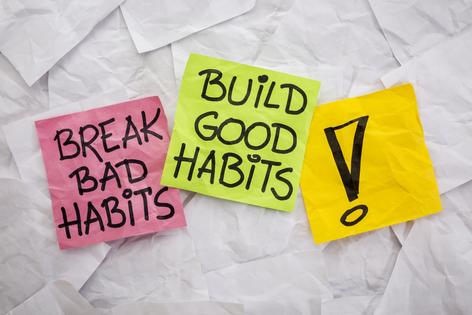How to break a bad habit
Published in Health & Fitness
We all have habits we’d like to get rid of, and every night we give ourselves the same pep talk: I’ll go to bed earlier. I will resist that cookie. I will stop biting my nails. And then tomorrow comes, we cave, and feel worse than bad. We feel defeated and guilty because we know better and still can’t resist.
The cycle is understandable, because the brain doesn’t make changes easily. But breaking an unhealthy habit can be done. It takes intent, a little white-knuckling, and some effective behavior modification techniques. But even before that, it helps to understand what’s happening in our brains, with our motivations, and with our self-talk.
We feel rewarded for certain habits
Good or bad habits are routines, and routines, like showering or driving to work, are automatic and make our lives easier. “The brain doesn’t have to think too much,” says Dr. Stephanie Collier, director of education in the division of geriatric psychology at McLean Hospital, and instructor of psychiatry at Harvard Medical School.
Bad habits are slightly different, but when we try to break a bad one we create dissonance, and the brain doesn’t like that, says Dr. Luana Marques, associate professor of psychology at Harvard Medical School. The limbic system in the brain activates the fight-flight-or-freeze responses, and our reaction is to avoid this “threat” and go back to the old behavior, even though we know it’s not good for us.
Often, habits that don’t benefit us still feel good, since the brain releases dopamine. It does this with anything that helps us as a species to survive, like eating or sex. Avoiding change qualifies as survival, and we get rewarded (albeit temporarily), so we keep reverting every time. “That’s why it’s so hard,” Collier says.
Finding the reason why you want to change
But before you try to change a habit, it’s fundamental to identify why you want to change. When the reason is more personal — you want to be around for your kids; you want to travel more — you have a stronger motivation and a reminder to refer back to during struggles.
After that, you want to figure out your internal and external triggers, and that takes some detective work. When the bad-habit urge hits, ask when, where, and with whom it happens, and how you are feeling, be it sad, lonely, depressed, nervous. It’s a mixing and matching process and different for every person, but if you notice a clue beforehand, you might be able to catch yourself, Collier says.
The next part — and sometimes the harder part — is modifying your behavior. If your weakness is a morning muffin on the way to work, the solution might be to change your route. But environments can’t always be altered, so you want to find a replacement, such as having almonds instead of candy or frozen yogurt in lieu of ice cream. “You don’t have to aim for perfect, but just a little bit healthier,” Collier says.
You also want to avoid the all-or-nothing mindset, which leads to quick burnout, and instead take micro-steps toward your goal, Marques says. If you stay up until midnight but want to be in bed at 10, the reasonable progression is: start with 11:45; the next night 11:30; the next 11:15 … It builds success and minimizes avoiding the new habit.
It also helps to remember that urges follow a cycle. They’re initially intense, then wane, and usually go away in about 20 minutes. Collier suggests setting a timer and focusing on “just getting through that.”
In that waiting period, seeking new sensations can provide useful distraction. You can go outside and feel the wind and smell the air. You can do something physical. Collier also likes using hot and cold. In the extreme, it’s submerging your face into a bowl of water, which can slow down your heart rate. But it could also be holding an ice cube or taking a hot shower. “You’re focused on the sensation and not the urge,” she says.
Accept that success isn’t a straight line
As you try to change, there will be bumps and setbacks, which are part of the process of lasting change. The problem is that we’re our own worst critics, and some people view anything except total success as complete failure.
Marques says to try to take a third-person perspective and think about how you’d react to a friend who said that having one bag of chips had ruined their whole diet. You’d be kind and reassuring, not critical, so give yourself the same treatment. A lot of the struggle with self-criticism is not seeing thoughts as facts, but merely thoughts. It takes practice, but it’s the same idea as with meditation. You treat what comes into your head as clouds, acknowledging them and letting them roll on through. “Everyone has distorted thoughts all the time,” Marques says. “It’s what you do with them.”
It also helps to reduce stress and minimize that sense of failure to know that the goal isn’t to make the old habit disappear, because it won’t. You’re just trying to strengthen the new routine so eventually it takes over, and the old habit isn’t even a thought. But it’s a constant process, made easier with self-compassion, because there’s no way to prepare for every situation or be able to predict when and where a trigger might happen.
“You can’t prepare for life,” Collier says. “Life is going to throw things at you.”
(Steve Calechman is a contributor to Harvard Health Publications.)
©2022 Harvard University. For terms of use, please see https://www.health.harvard.edu/terms-of-use. Distributed by Tribune Content Agency, LLC.










Comments